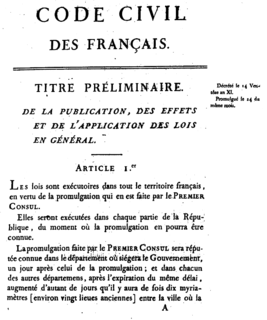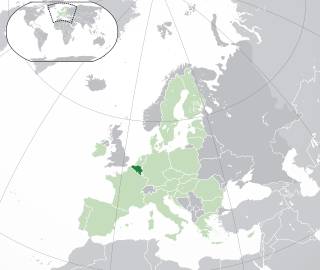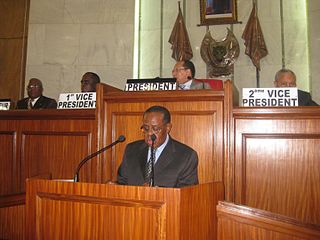Divorce in Belgium occurs at a higher rate than in most other European countries. [1] The divorce law in Belgium underwent major modifications in 2007. [2] The new law came into force in September 2007. [3]
Divorce in Belgium occurs at a higher rate than in most other European countries. [1] The divorce law in Belgium underwent major modifications in 2007. [2] The new law came into force in September 2007. [3]
Tile VI. - About divorce (TITRE VI. - DU DIVORCE) defines the grounds for divorce. There are several types of divorce: [4]
Divorce was allowed in the 19th century, and Belgium was one of the European countries to allow divorce by mutual consent before the 1970s, although in practice this was applied restrictively. Divorce could be obtained on a fault ground or by mutual consent. In 1974, a new additional ground was added allowing for unilateral divorce based on a ten-years separation period. In 1982, this was reduced to five years, and in 2000 to two years. In 1987, adultery was decriminalized, [5] although it remained a ground of divorce. Although in 1994 the divorce procedure was drastically reformed, the grounds of divorce and its consequence remained the same. Until 2007, Belgium law remained a strong fault-based system, and the party who cited separation as ground to divorce against the will of the 'innocent' spouse was deemed to be at fault. [6] The new divorce law of 2007 is largely no-fault, although some serious faults regarding the conviction of a criminal offense against the other spouse prohibit the asking of alimony by the guilty party (see Article 301). [7]
Divorce is the process of terminating a marriage or marital union. Divorce usually entails the canceling or reorganizing of the legal duties and responsibilities of marriage, thus dissolving the bonds of matrimony between a married couple under the rule of law of the particular country or state. Divorce laws vary considerably around the world, but in most countries, divorce requires the sanction of a court or other authority in a legal process, which may involve issues of distribution of property, child custody, alimony, child visitation / access, parenting time, child support, and division of debt. In most countries, monogamy is required by law, so divorce allows each former partner to marry another person.

The Napoleonic Code, officially the Civil Code of the French is the French civil code established under the French Consulate in 1804 and still in force, although frequently amended.
Alimony is a legal obligation on a person to provide financial support to their spouse before or after marital separation or divorce. The obligation arises from the divorce law or family law of each country.
A prenuptial agreement, antenuptial agreement, or premarital agreement, is a written contract entered into by a couple prior to marriage or a civil union that enables them to select and control many of the legal rights they acquire upon marrying, and what happens when their marriage eventually ends by death or divorce. Couples enter into a written prenuptial agreement to supersede many of the default marital laws that would otherwise apply in the event of divorce, such as the laws that govern the division of property, retirement benefits, savings, and the right to seek alimony with agreed-upon terms that provide certainty and clarify their marital rights. A premarital agreement may also contain waivers of a surviving spouse's right to claim an elective share of the estate of the deceased spouse.

In many traditions and statutes of civil or religious law, the consummation of a marriage, often called simply consummation, is the first act of sexual intercourse between two people, either following their marriage to each other or after a short or prolonged romantic/sexual attraction. The definition of consummation usually refers to penile-vaginal sexual penetration, but some religious doctrines hold that there is an additional requirement that no contraception must be used.
Same-sex marriage in Luxembourg has been legal since 1 January 2015. A bill for the legalisation of same-sex marriages was enacted by the Chamber of Deputies on 18 June 2014 and signed into law by Grand Duke Henri on 4 July. Partnerships have also been available in Luxembourg since November 2004.

The Divorce Act is the federal Act that governs divorce in Canada. The Constitution of Canada gives the federal Parliament exclusive jurisdiction to regulate the law of marriage and divorce.
Covenant marriage is a legally distinct kind of marriage in three states of the United States, in which the marrying spouses agree to obtain pre-marital counseling and accept more limited grounds for later seeking divorce. Louisiana became the first state to pass a covenant marriage law in 1997; shortly afterwards, Arkansas and Arizona followed suit. Since its inception, very few couples in those states have married under covenant marriage law.
Australian family law is principally found in the federal Family Law Act 1975 as well as in other laws and the common law and laws of equity, which affect the family and the relationship between those people, including when those relationships end. Most family law is practised in the Federal Circuit Court of Australia, Family Court of Australia or the Family Court of Western Australia depending on the location and complexity of the matter. Australia recognises marriages entered into overseas as well as divorces obtained overseas if they were effected in accordance with the laws of that country. Australian marriage and "matrimonial causes" are recognised by sections 51(xxi) and (xxii) of the Constitution of Australia and internationally by marriage law and conventions, such as the Hague Convention on Marriages (1978).

The Court of Cassation of Belgium is the supreme court of the Belgian judiciary. The Court is composed of thirty judges with life tenure who are nominated by the High Council of Justice of Belgium and appointed by the Belgian federal government. The Court handles cases in the two main languages of Belgium, being Dutch and French, and provides certain facilities for cases in German. The Court is assisted in its work by a public prosecutor's office and a bar association, which both function separately from other structures. The duty of the public prosecutor's office is to provide advisory opinions to the Court on how the law ought to be interpreted and applied. The attorneys of the Court's bar association assist litigants in proceedings before the Court; in certain cases their assistance is mandatory.

Lesbian, gay, bisexual, transgender (LGBT) rights in Belgium are seen as some of the most progressive in Europe and in the world. In 2021, ILGA-Europe ranked Belgium as second in the European Union for LGBT rights protection, behind Malta.

Lesbian, gay, bisexual and transgender (LGBT) people in Luxembourg enjoy similar rights to non-LGBT people. Partnerships, which grant many of the benefits of marriage, have been recognised since 2004. In June 2014, the Luxembourgish Parliament passed a law enabling same-sex marriage and adoption rights, which took effect on 1 January 2015. Additionally, discrimination on the basis of sexual orientation and "change of sex" in employment, healthcare and the provision of goods and services is outlawed, and transgender people are allowed to change their legal gender on the basis of self-determination.
This article is a general overview of divorce laws around the world. Every nation in the world allows its residents to divorce under some conditions except the Philippines and the Vatican City, an ecclesiastical sovereign city-state, which has no procedure for divorce. In these two countries, laws only allow annulment of marriages.

The tribunals of first instance are the main trial courts in the judicial system of Belgium. The tribunals of first instance are courts of general jurisdiction; in the sense that they have original jurisdiction over all types of cases not explicitly attributed to other courts. They handle a wide range of civil cases, criminal cases, and cases under the scope of juvenile law and family law. They also hear appeals against the judgements of the police tribunals and justices of the peace. The judgements of the tribunals of first instance can be appealed to the courts of appeal in turn. There is a tribunal of first instance for each of the twelve judicial arrondissements ("districts") of Belgium, except for the arrondissement of Brussels. The arrondissement of Brussels has two tribunals of first instance, a Dutch-speaking one and a French-speaking one, due to the sensitive linguistical situation in the area. The territories of the current judicial arrondissements largely coincide with those of the provinces of Belgium. Most of the tribunals of first instance have multiple geographical divisions, with each having their own seat. As of 2020, the 13 tribunals of first instance have 27 seats in total. Further below, an overview is provided of all seats of the tribunals of first instance per arrondissement.

The court of assizes is the trial court which tries the most serious crimes in the judicial system of Belgium. It is the highest Belgian court with criminal jurisdiction, and as such, it is the only Belgian court that can sentence someone to life imprisonment. The courts of assizes are not permanent courts; a new court of assizes is assembled for each new trial. There is a court of assizes in each of the ten provinces of Belgium, and one in the arrondissement of Brussels-Capital. Further below, an overview is provided of the eleven courts of assizes and their seats. They are the only courts in Belgium for which the provinces are used as territorial subdivisions. They are also the only courts in Belgium that hold jury trials. The jury acts as sole trier of fact, but decides on the penalty together with the judges. The trial by jury of certain crimes is laid down in article 150 of the Belgian Constitution. The Belgian courts of assizes have the same origin as their French namesakes.
Divorce in the United States, also known as dissolution of marriage, is a legal process in which a judge or other authority dissolves the bonds of matrimony existing between two persons, thus restoring them to the status of being single and permitting them to marry other individuals. In the United States, marriage and divorce fall under the jurisdiction of state governments, not the federal government.

Charles Mwando Simba was a Congolese politician and member of UNADEF. He was born in Moba, Tanganyika District. From February 6, 2007, to October 2008, he served in the government of the Democratic Republic of the Congo as Minister of Rural Development. In October 2008, he was appointed as Defense Minister in Adolphe Muzito's cabinet, succeeding Chikez Diemu. In April 2012, he became the First Vice-President of the National Assembly of the Democratic Republic of the Congo, a position he held until his death.

Divorce law in Sweden concerns the dissolution of marriage, child support, alimony, custody and the division of property. Divorce restores the status of married people to individuals, leaving them free to remarry. The divorce laws in Sweden are known to be considerably liberal compared to other jurisdictions.
In 2004, the incidence of rapes recorded by the police in Belgium was 28.4 per 100,000 people, according to data by UNODC; in 2008 it was 29.5 per 100,000 people. Belgium has been reported as being one of the countries with the highest rate of rape.
Recognition is the process in some jurisdictions whereby a man is recognised as the father of a child in situations where there is no presumption of paternity, generally due to the mother being unwed. Historically due to the Roman law principle of Mater semper certa est this action was not available to mothers, but since the introduction of in-vitro fertilisation this has changed. It is an act that confers legitimacy on the child.